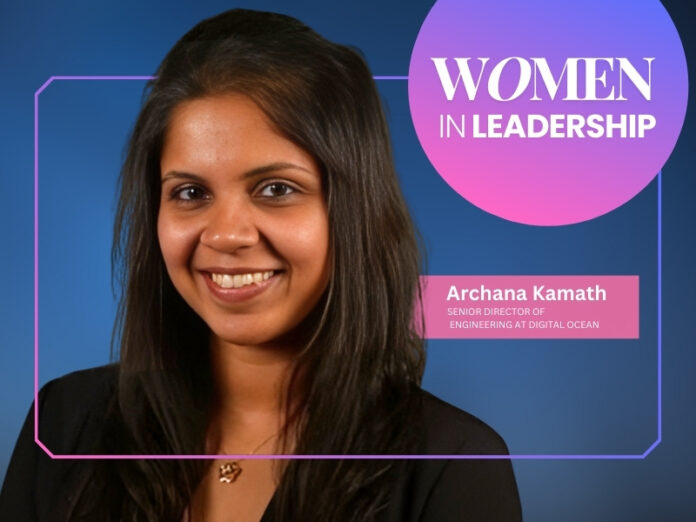Interview with Archana Kamath of DigitalOcean
From her early fascination with electronics to her leadership in software-defined networking (SDN), Archana Kamath, Senior Director of Engineering at DigitalOcean, shares how curiosity and passion have shaped her career. She discusses the challenges of leading innovation in cloud networking, breaking gender barriers in tech, and the importance of mentorship in fostering diversity. Gain valuable lessons from a leader who’s driving change and innovation in the evolving tech landscape.
Can you share what initially inspired you to pursue a career in engineering, and what motivated you to specialise in software networking?
It was pure curiosity that drove me to pursue a Bachelors in Electronics and Communications at the Visvesvaraya Technology University in India, followed by a Masters in Electrical Engineering at Penn State. During my Masters, I studied ASIC design for Network on Chips, which sparked my interest in networking.
The evolution of networking technology has gone from hardware-focused networking in physical switches and routers, to the software-defined networking (SDN) we see today. The field has undergone an incredible transformation and this evolution is what keeps me motivated and engaged.
During the past six years at DigitalOcean, I’ve had the opportunity to work on cutting-edge networking solutions that directly impact the customer experience. Leading teams that develop core SDN features like Virtual Private Cloud, Load Balancers and Cloud Firewalls allows me to contribute to the infrastructure that powers businesses worldwide. The challenge of creating efficient, scalable networking solutions in a cloud environment is what pushes me to innovate and learn, making every day in this field exciting and rewarding.
What are some unique technical and managerial challenges you face overseeing DigitalOcean’s Compute and Network product offerings and Software Defined Networking? Overcoming Gender Barriers?
Managing DigitalOcean’s networking products presents both technical and leadership challenges. On the technical side, we’re constantly pushing the boundaries of what’s possible in cloud networking. It’s this tenacity and ambition that I admire most about the business. Our team of 30 engineers work on complex systems like Virtual Private Cloud, Load Balancers, and Cloud Firewalls. The challenge lies in creating scalable, efficient solutions that meet our customers’ evolving needs while maintaining the simplicity and performance DigitalOcean is known for.
The challenge of creating efficient, scalable networking solutions in a cloud environment is what pushes me to innovate and learn, making every day in this field exciting and rewarding.
Managerially, the key is balancing short-term deliverables with long-term strategic goals. We must meet immediate customer needs while also innovating for the future. This requires clear communication, both within the team and across the organisation, to ensure everyone is aligned on our priorities and direction.
Regarding gender barriers, the tech industry has made progress, but challenges remain. As a woman in a leadership role, I focus on creating an inclusive environment where all team members can thrive. This includes advocating for diverse perspectives in decision-making processes and actively mentoring emerging leaders. I believe that I’m in a rare position, but through fostering a culture of equality and respect, we’re able to, not only overcome barriers, but drive innovation through diverse thinking.
As a senior leader in engineering, what specific strategies or initiatives do you believe can help improve the representation of women in managerial roles within the tech industry?
Improving women’s representation in tech leadership roles requires a multi-faceted approach. This includes:
- Encouraging them to pursue STEM education and providing them with role models and mentors in the field. This lays the foundation for a diverse talent pipeline. Implementing unbiased hiring and promotion practices is crucial. An important step is to create diverse interview panels and structured evaluation processes to minimise any unconscious biases. We should also offer leadership development programmes specifically tailored for women in tech to provide them with the skills and confidence to step into managerial roles.
- Creating a supportive work environment is equally important. This means offering flexible work arrangements, parental leave policies, and a culture that values work-life balance. These practices benefit all employees but can be particularly impactful for women.
- Increasing visibility. We need to actively showcase women leaders in tech, both within our organisations and in the broader industry. This not only provides inspiration but also challenges stereotypes about what a tech leader looks like.
If we can achieve this – and I’m aware of the scale of the challenge – we can create a tech industry where women can not only see a clear path to leadership roles but feel empowered to pursue them.
How would you describe your leadership style, and how has it evolved since you first became part of the management team?
My leadership style is collaborative, empowering, and focused on growth – both for the team and for individual team members. I believe in setting clear goals and expectations, then trusting my team to deliver while providing support and guidance as needed.
When I first moved into management, I learned to let go of hands-on programming and focus on enabling my team’s success. I’ve learned the importance of delegation and empowerment, matching team members with projects that align with their skills and career goals.
I’ve also come to appreciate the power of cross-functional collaboration. In my current role, I work closely with product managers, executives, and customers to ensure our networking solutions meet business needs while driving innovation. This broader perspective allows me to guide my team more effectively and align our work with DigitalOcean’s overall strategy.
What methods do you use to foster innovation and creativity within your teams, especially in such a fast-paced and evolving field as software networking?
Fostering innovation in software networking requires creating an environment where creativity can flourish. As a leader, I focus on two key strategies:
First, I encourage open communication and idea sharing. We hold brainstorming sessions where team members can propose new solutions or improvements. We cultivate a culture where it’s safe to take calculated risks, viewing failures as learning opportunities. This is complemented by our commitment to continuous learning, exploring new technologies and attending industry conferences.
Second, we emphasise cross-functional collaboration. By bringing together perspectives from different teams – networking, compute, storage – we uncover innovative solutions that wouldn’t have been possible in silos. Regular interactions with our users help us understand their evolving needs, inspiring creative solutions to real-world problems.
This approach creates an environment where breakthrough innovations can emerge, driving our software networking solutions forward and ultimately benefiting our customers.
How important is mentorship in the tech industry, and what advice do you have for both mentors and mentees to make these relationships effective?
Mentorship is crucial in the tech industry, providing support, guidance, and insights that accelerate growth and boost diversity.
For mentors, my advice is to listen actively and ask thought-provoking questions. Your role is not to provide all the answers, but to guide your mentee in finding their own path. Share your experiences, both successes and failures, as these real-world lessons are invaluable. Be patient and remember that each mentee’s journey is unique.
To all women considering a career in engineering, I’d say this: your perspective, skills, and innovation are essential. The challenges are real but not insurmountable, and the rewards far outweigh them.
For mentees, I recommend being proactive and clear about your goals. Come prepared to meetings with specific questions or topics you want to discuss. Be open to feedback and be willing to step out of your comfort zone. Remember, your mentor is there to support you, but the drive for growth must come from within.
Both parties should approach the relationship with commitment and respect for each other’s time. Regular check-ins help maintain momentum, but flexibility is important as priorities can shift.
Effective mentorship can be transformative, not just for the mentee, but also for the mentor and the organisation as a whole.
On the occasion of International Women in Engineering Day, what message would you like to convey to women who are considering a career in engineering but may feel deterred by the industry’s challenges?
To all women considering a career in engineering, I’d say this: your perspective, skills, and innovation are essential. The challenges are real but not insurmountable, and the rewards far outweigh them.
Engineering offers the opportunity to solve real-world problems, innovate, and shape the future of technology. It’s a field that constantly evolves, providing endless opportunities for growth. Your unique viewpoints are crucial in driving innovation forward.
Remember, obstacles are opportunities to demonstrate your resilience, creativity, and leadership. Every challenge you overcome advances your career and paves the way for other women.
Seek out mentors, build a supportive network, and voice your ideas. Your contributions are valuable, and the industry increasingly recognises the importance of diverse perspectives.
Embrace the challenges, celebrate your achievements, and know that you have the power to change this exciting field.
Executive Profile






































